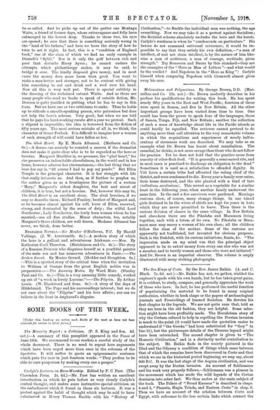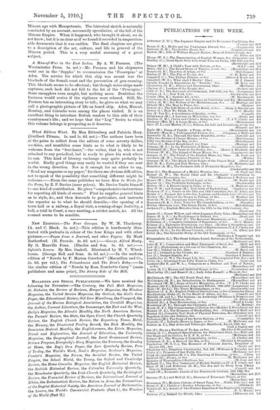The Sea Kings of Crete. By the Rev. James Baikie.
(A. and C. Black. 7s. 6d. net.)-.-Mr. Baikie has not, we gather, wielded the explorer's spade with his own hands, but he has taken great pains, it is evident, to study, coinpare, and generally appreciate the work of those who have. In fact, he has performed the useful function of popularising the material to be found in many original authorities, whether in book shape or the papers of archaeological journals and Proceedings of learned Societies. He devotes his first chapter to the legends. We are not quite sure that, told as they are here in the old fashion, they are helpful. Some selec- tion might have been profitably made. The Herodotean story of why the Cretans refused to help in repelling the Persian invasion is much to the point (it would have made the quotation easier to understand if "the Greeks" bad been substituted for " they " in line 31), but the picturesque details of the Theseus legend might have been retrenched. The second chapter is given to "The Homeric Civilization," and is a distinctly useful contribution to the subject. Mr. Baikie finds in the society pictured in the Iliad and the Odyssey a condition of things which came between that of which the remains have been discovered in Crete and that which we see in the historical period beginning, we may say, about 800 B.C. It was the last stage of the Aegean civilisation, and was swept away by the Dorian invasion. An account of Schliemann and his work very properly follows,—Schliemann was a pioneer in the movement which has made the wild legends of the Cretan dominion into sober fact. We thus arrive at the main subject of the book. The Palace of "Broad Knossos" is described in chaps. 4 and 5, " Pliaesta, Hagia Triada, and Eastern Crete" in chap. 6. Then we have an account of the relation between Crete and Egypt, with reference to the less certain rinks which connect the
Minoan age with Mesopotamia. The historical sketch is naturally concluded by an account, necessarily speculative, of the fall of the Minoan Empire. When it happened, who brought it about, we do not know ; but it is as clear as if we found it recorded in unquestion- able documents that it was sudden. The final chapters are given to a description of the art, culture, and life in general of the Minoan period. This is a very useful summary of a great subject.



































































 Previous page
Previous page